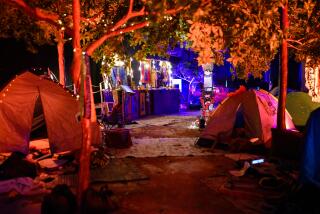Are Presenters Shying Away From Middle Eastern Dance?
Avaz artistic director Anthony Shay likes to call his locally based folk company “the CNN of the Arts . . . We have a dance for every (world) crisis.” In the wake of the Persian Gulf War, however, his remarks have gained an edge of gallows humor as Avaz faces its own crisis because of the traditional Middle Eastern music and dance presented by the 60-member company.
Avaz’s normal performance schedule has shrunk to the point that, Shay says, “this upcoming season, our entire activity is dead.” The reason? “Anything that is Middle Eastern scares them (many arts presenters) to death,” he says.
“Mary Beth Treen, my booking agent, called me just before we went to war,” he recalls, “and asked, ‘Can we just do a whole year of Eastern European material (instead of including the Middle Eastern pieces)?’ I said we could , but why would we want to do that? She said people were walking away from us because of the Middle Eastern repertory.
“We do a lot from Iran,” he explains. “We have a Kurdish suite from Iran and Iraq. We have Saudi Arabia and Gulf material, both Persian side and Arab. We have Turkey.” All of these dances, he says, depict court rituals and performance traditions dating back many centuries, as well as social dances of village and tribal peoples. “None of them,” he insists, “have any political content.
“Because a large number of Americans can hardly find the Middle West on their maps, much less the Middle East, people lump all the groups together. And rather than risk somebody walking out because they think we’re representing the enemy on the stage, presenters would rather not deal with any of it. I think that’s what the bottom line is.”
Shay, 54, flatly refused to alter his repertory. “I keep telling people this is as much censorship as what (Jesse) Helms is trying to do (with the National Endowment for the Arts). It’s just a different kind, and it may be a little more subtle but it’s basically the same thing: a kind of Arab-bashing and I just can’t be part of it.”
Instead, he plans to do workshops and a number of other local activities “rather than let someone start dictating (repertory) to us. This is going to be a very difficult and interesting time for us.”
Treen, a booking agent for her own artist management firm in Burbank, estimates that in the current recessionary economy, her other clients are down about a third in their bookings--but Avaz’s bookings are 60% down this season. During a peak year, she says, Avaz might tour 20 to 30 different venues.
Treen believes that if the company had offered a program without anything from the Middle East, touring prospects would have been substantially higher. “It just seemed like they got caught in a squeeze that really affected them financially this year,” she says.
Treen, who has represented Avaz for six years, says two sponsors who agreed to present Avaz withdrew their “promised dates” shortly after the war broke out. “One of them asked me if Tony could delete his Middle Eastern repertory,” Treen says.
She declines to name them (“I don’t want any finger-pointing”) but describes them as “city-owned facilities in California. I happen to know both of these presenters very well. They both stewed and fretted over their decisions. They deliberated over them for a couple of days in each case.”
Because the actual nailing down of contracts for the season happens each year in January and February, Treen says: “At the time when most of the (‘91-’92) booking was done, everyone was very much focused on the war.”
“The decisions were mostly governed by (their estimation of) the audience response. That and how the war would accelerate and how it might affect the general attitude toward the Middle East. Because the people in this particular field book a year or so down the line, they were concerned with how the state of the war and the hostages and the possible deaths or prisoners would affect the general population and how touchy their audiences might be.”
Treen acknowledges that “the only pointed conversations that I had asking about the (Avaz Middle Eastern) repertory were those two withdrawals.” However, Treen says, “There are a lot of people who wouldn’t have the gumption to address that issue openly, because it is censorship. They’ll just say, ‘No, I’m not interested in the company this season.’ ”
People who did book Avaz during the Gulf War report no disturbances during performances and no complaints afterwards. Lee Burrows presented the company in the Northern California city of Marysville on Jan. 18, just after hostilities broke out. “For our particular area, there was a good turnout,” she says. “People left feeling good about the program. All the comments we got were very positive.”
Shay, however, remembers being nervous about that engagement. “On the way to Marysville, we heard that the Scuds were falling in Tel Aviv,” he says. “And when I was in the theater before the performance, one of my dancers came back and said, ‘We’re going to have a lot of trouble. There are some people in the audience that are talking about getting up and walking out if we do any of those “Persian” dances.’ So I said, ‘I’ll take care of it. I’ll go out and say something.’
“So I said, ‘Some of the dances that we do used to be from very obscure places in the minds of most Americans. But now they’re bursting into our headlines. We have done them for a long time, we love the material very much, but our performance of them is by no means an endorsement of all the governments in the area.’ ”
Nobody walked out, he says, and the company received four curtain calls.
Other local companies presenting Middle Eastern material deny experiencing pressure to change their programming. Aisha Ali’s group performs work from Egypt, North Africa, the Gulf Emirates, and Turkey (mostly for educational institutions and within the Arab-American community).
At the beginning of the Gulf crisis, she says, “I got statements of concern from many of my American friends. But I never had any negative experiences. If anything, it (the Gulf conflict) made people have more empathy for one another.”
Barry Glass, artistic director of the Aman Folk Ensemble, says that the Gulf War hasn’t affected his touring--though, over the years, the repertory has included dances from Iran, Kurdistan, Yemen, Lebanon, Turkey, Egypt and North Africa.
“One sponsor even asked last fall if we could do an all-Iraqi evening,” he says. “If I did receive pressure, I would have to be true to what the company does and not change the program for that reason.”
Shay dismisses these remarks by Glass and Ali as coming from different performing circumstances. “Currently we’re the only major performing company in the country with a sizable, hefty Middle Eastern repertory,” he says, “the only company that in fact can do a whole evening and give equal coverage to the Arab countries and Iran and Israel and Central Asia and Turkey. That’s a big difference from just having two or three numbers from the region.”
More to Read
The biggest entertainment stories
Get our big stories about Hollywood, film, television, music, arts, culture and more right in your inbox as soon as they publish.
You may occasionally receive promotional content from the Los Angeles Times.










